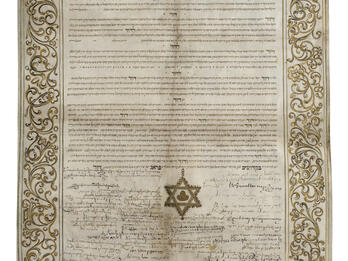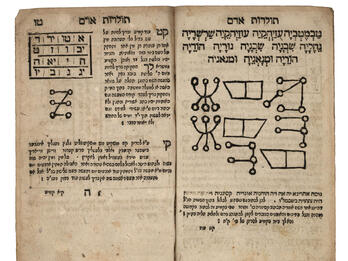The Biography of Shabbetai Tzvi
It happened one day that Sabbatai Zevi returned from Egypt with his wife. As he entered Gaza, the prophet Nathan cried out with a loud voice: “This is the saviour of Israel, the messiah of the God of Jacob! Apart from him, Israel has no redeemer whatever! Every prophecy of every prophet was spoken about him!”
Sabbatai Zevi heard about this while he was in Gaza, and he sent for [Nathan]. A great fear then fell upon Nathan, and he came trembling and shuddering, his body bowed low. And he fell on the ground before him.
“What are you saying, that I am the saviour of Israel?” Sabbatai Zevi said to him.
[Nathan] was so terrified, so beset by trembling and shivering, that he had no strength to reply. Finally [Sabbatai] said: “I command you to stand up firmly! Speak straight out what you know about me, and who told you I am Israel’s saviour!”
He answered, still shaking: “Thus I have spoken with the Lord.” He went on to describe all the things that had transpired between Sabbatai Zevi and God, on those occasions when [Sabbatai] had secluded himself with his Creator. “You see,” he said, “I know those things that transpired between you and God. And as for your demand that I say who told me you are God’s messiah—it was God who told me, in a prophetic vision!”
He thereupon burst into prophecy. He began in the following way: “I swear, by the great, mighty and terrible name of God, that with my own eyes and in a state of wakefulness I have seen the Divine Chariot, just as the prophet Ezekiel saw it by the River Chebar! I saw the ten sefirot spread out before me like the ocean’s waves. From the midst of them a voice came to my ears, speaking as follows: Thus saith the Lord: Behold your savior comes, Sabbatai Zevi his name. Like a mighty man shall he go forth, like a warrior shall he stir up passionate zeal. He shall give forth a loud trumpeting cry, mightily triumphing over his enemies.1 No sooner did this great voice reach me than the prophecy was inscribed before me in letters of fire. All of this I saw in a state of wakefulness, in a prophetic vision.”
All the time that he was speaking with Sabbatai Zevi there was no one else with them. It was only afterwards that Nathan the prophet revealed what he chose of the words that had passed between the two of them. As he left Sabbatai Zevi’s presence the sweat streamed copiously from him; his knees shook, his limbs could hardly function together. “What is this trembling about?” his familiars asked him. “We’ve been with Sabbatai Zevi, and we had no fear or dread of him!” To which [Nathan] replied: “If you only knew what I know, your souls would fly straight out of you the moment you looked at his face. He sets the upper and lower realms to quaking; all of the heavens shudder whenever his name is mentioned in the firmament, and all the angels tremble and say, Holy. How might we have the strength to stand in his presence and speak to him face to face?”
Another report circulated to the effect that Sabbatai Zevi asked the prophet Nathan, “How did you begin to experience all this?” And Nathan told him. Afterwards [Nathan] said to him: “The prophet Elijah gave me a book that begins with you and ends at the close of the sixth millennium, describing everything that is going to happen in the world.” [Sabbatai] demanded he bring him the book, which he did.
[Sabbatai] cut the first page out of the book, and returned the rest of it. “Go to the graveyard,” he said, “and hide this [book] in a certain place where it will be very well concealed. Keep this [first] page; you may show it to anyone you please. But all [the rest of] what you have seen written, you must keep to yourself.”
That one page came to be well known back then, to all the outstanding personages of the time. It begins with the words Behold a son shall be born to Mordecai Zevi in the Year of Creation 5386, written in a most archaic script upon paper worn away with the passage of much time. Several times have I seen a copy of it. I cannot remember the precise language written upon that sheet of paper. Yet those were matters fearful and mysterious.
In those days did the prophet Nathan reveal the graves of many ancient holy men, tana’im and amora’im, in the vicinity of Gath and Lydda and Yavneh. He would stretch himself out upon the grave and make connection [with the holy man’s spirit], and a voice would arise from the grave and speak with him as he pleased.
Many extraordinary things were attested. I myself did not see them. Yet I can affirm with certainty that some of the great Jewish dignitaries of that generation would accost the prophet Nathan and beg him to tell them truly when would come the End of Wonders, that time fixed by God. “During the month of Nisan,” he said, “Sabbatai Zevi will rise to greatness, publicly revealed as acknowledged messiah”—yet he did not say which Nisan he had in mind, whether of 5426 [1666] or of 5427 [1667]. They asked: “Yet perhaps, on account of our sins, some confusion may ensue?” To which he replied: “He is [the messiah], and no one else. Yet the time for the rebuilding of the Temple and the ingathering of the exiles has not yet arrived.” “When will that happen?” they asked. And he answered: “That matter is sealed and concealed until the time of the end.”—All this I have heard from reliable sources.
Notes
Words in brackets appear in the original translation.
Isa. 42:13—referring, in its original context, to God.
Credits
Abraham Cuenque, “The Biography of Abraham Cuenque,” trans. David J. Halperin, first published in Sabbatai Zevi: Testimonies to a Fallen Messiah by David J. Halperin (Oxford and Portland, Ore.: Littman Library of Jewish Civilization, 2007), pp. 164–66. Copyright © David Halperin, 2007. Used with permission of the publisher.
Published in: The Posen Library of Jewish Culture and Civilization, vol. 5.




